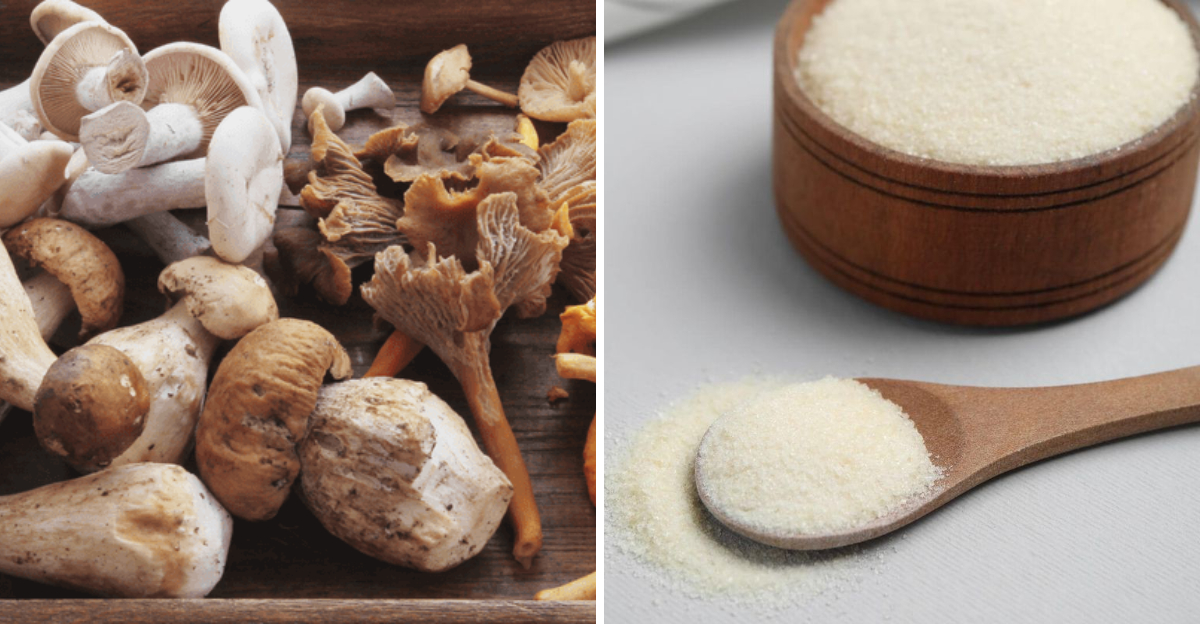15 Healthy Psyllium Husk Substitutes Commonly Used in Oregon

Looking for a good replacement for psyllium husk in your recipes? Oregon’s health-conscious communities have embraced many natural alternatives that work just as well. Whether you’re dealing with dietary restrictions or simply ran out of psyllium, these substitutes can help maintain your fiber intake while adding unique flavors to your dishes. Many are locally sourced from Oregon’s abundant natural resources.
1. Ground Flaxseeds
Golden and nutty, ground flaxseeds offer similar gel-forming properties to psyllium when mixed with water. They’re packed with omega-3 fatty acids and lignans that support heart health.
Oregon’s cool climate is perfect for growing flax, making it readily available at farmers’ markets throughout the Willamette Valley. Just two tablespoons provide about 4 grams of fiber.
2. Chia Seeds
Small but mighty, chia seeds create a thick gel when soaked in liquid. Portland nutritionists recommend them for their impressive protein content alongside fiber benefits.
Unlike psyllium, chia adds a slight crunch to smoothies and baked goods. Many Oregon bakeries incorporate these nutrient-dense seeds into their gluten-free offerings. They’re especially popular in the health-focused neighborhoods of southeast Portland.
3. Oregon-Grown Oat Fiber
Harvested from local farms in the eastern part of the state, Oregon-grown oat fiber provides impressive binding properties in recipes. The neutral taste makes it perfect for baking projects where you don’t want to alter flavors.
Unlike psyllium’s sometimes slimy texture, oat fiber creates a more pleasant mouthfeel. Many Eugene bakeries use it in their gluten-free bread recipes for its ability to mimic wheat’s structure.
4. Marionberry Pectin
A uniquely Oregonian solution! Extracted from the state’s famous marionberries, this natural pectin works wonderfully as a binding agent in recipes. Beyond thickening, it adds subtle berry notes to your dishes.
Found at specialty stores in the Willamette Valley, marionberry pectin contains beneficial compounds not present in psyllium. Local jam makers originally discovered its effectiveness as a psyllium substitute when experimenting with low-sugar preserves.
5. Coconut Fiber
Coconut fiber has become a staple in Portland’s tropical-inspired cafes. The mild flavor complements both sweet and savory dishes while providing similar binding properties to psyllium.
Oregon’s humid coastal regions have specialty markets where this fiber is readily available. Many local gluten-free bakeries combine it with other fibers for optimal texture. Its moisture-retention properties make it especially useful in baked goods.
6. Hazelnut Meal
Oregon produces 99% of America’s hazelnuts, making this fiber-rich meal an accessible psyllium alternative. The nutty flavor enhances baked goods while providing binding properties.
Farmers around McMinnville sell fresh hazelnut meal at weekend markets. Unlike psyllium, hazelnut meal adds protein and healthy fats to recipes. Many local chefs prefer it in heartier applications like veggie burgers and energy bars.
7. Xanthan Gum
A favorite among Bend’s gluten-free community, xanthan gum creates the elastic texture needed in baking. Just a quarter teaspoon often replaces a full tablespoon of psyllium.
Central Oregon’s natural food stores stock various brands of this fermented fiber substitute. Unlike psyllium’s gradual thickening, xanthan works almost instantly when added to liquids. Many local breweries even use it to create body in their gluten-free beers.
8. Apple Fiber
Hood River’s abundant apple orchards provide a steady supply of apple fiber to Oregon markets. This mild-flavored powder works similarly to psyllium in recipes while adding a subtle sweetness.
Local nutritionists praise apple fiber for its gentle effect on digestion compared to psyllium. The Hood River Valley’s microclimate produces apples with particularly high pectin content. Many regional kombucha brewers use it to create thickness in their fermented drinks.
9. Douglas Fir Tip Powder
An innovative substitute emerging from Oregon’s foraging community! Sustainably harvested young Douglas fir tips are dried and powdered to create a fiber-rich thickener with citrusy notes.
Foragers around Corvallis supply this unique ingredient to experimental chefs. While less common than other alternatives, it provides similar binding properties to psyllium. The powder’s distinctive flavor works especially well in spring-inspired dishes and foraged food preparations.
10. Seaweed Derivatives
Oregon’s coastal communities have embraced various seaweed derivatives as psyllium alternatives. Agar-agar and carrageenan, harvested from local waters, provide excellent gelling properties.
Newport’s seafood markets offer these sea vegetables in various forms. Unlike psyllium, these marine thickeners work best when heated first. Coastal restaurants incorporate them into plant-based dishes that need structure without animal-derived ingredients.
11. Arrowroot Powder
Portland’s alternative baking scene has long relied on arrowroot powder when psyllium isn’t available. This starchy powder creates a smooth texture without the sometimes gritty feel of psyllium.
Many local paleo and AIP diet followers prefer arrowroot for its digestibility. Unlike psyllium, it’s nearly flavorless and won’t affect the taste of delicate recipes. Oregon’s humid climate keeps this tropical-derived powder in high demand at specialty markets throughout the state.
12. Blackberry Seed Fiber
Oregon’s wild blackberries yield a fiber-rich byproduct after juice extraction. This seed fiber provides similar binding properties to psyllium while adding subtle fruity notes to recipes.
Found at farmers’ markets across the Willamette Valley during summer months. The fiber contains beneficial antioxidants not present in psyllium. Local ice cream makers use it to create structure in dairy-free frozen desserts without the gumminess of other thickeners.
13. Hemp Fiber
Southern Oregon’s hemp farms produce fiber-rich hemp hearts and hemp flour that work beautifully in place of psyllium. The earthy flavor complements whole grain recipes especially well.
Ashland’s health food stores showcase locally grown hemp products. Unlike psyllium, hemp adds protein and essential fatty acids to recipes. The regenerative farming practices used by Oregon’s hemp growers make this a particularly sustainable choice for environmentally conscious consumers.
14. Mushroom Fiber
Oregon’s fungus enthusiasts have discovered that certain mushroom species, when dried and powdered, create excellent binding agents. Lion’s mane and turkey tail varieties are particularly effective substitutes for psyllium.
Foragers around Eugene supply these specialty ingredients to local markets. Beyond binding properties, these mushroom fibers add immune-supporting compounds to recipes. Many regional coffee shops incorporate them into their plant-based food offerings.
15. Grass-Fed Gelatin
From Oregon’s pasture-raised cattle comes this protein-rich psyllium alternative. Though not plant-based, grass-fed gelatin provides excellent binding properties while supporting joint health.
Ranchers in eastern Oregon supply this sustainable animal product to health food stores statewide. Unlike psyllium, gelatin adds protein rather than fiber to recipes. Many Portland paleo cafes use it in everything from desserts to savory aspics when plant-based alternatives aren’t required.






